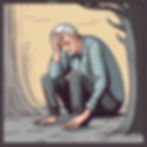Exploring the Unspoken: Navigating the Depths of Men's Grief
- kelleyrogers06
- Nov 6, 2024
- 3 min read
Updated: Nov 8, 2024

Grief is a universal experience that affects everyone, but how it shows up can differ based on gender, culture, and individual personality. In many cultures, traditional views often downplay men's grief, branding them as stoic, while women are seen as more emotional. This post explores how men experience and navigate grief. It highlights the unique challenges they face and provides insights into healthier coping methods.
The Silence Around Men's Grief
In various cultures, men receive messages to "man up" or "be strong," pushing them to bury their emotions. This pressure can lead to a profound silence around grief. For instance, a study found that 70% of men reported feeling they could not express sorrow openly. This stigma creates barriers that prevent important conversations, hindering the healing process.
Because of these societal expectations, many men experience a buildup of unresolved feelings. Research shows that about 60% of men exhibit elevated levels of anger and frustration during periods of grief. This internal struggle can lead to isolation and emotional disconnect.
Recognizing the Signs of Grief in Men
Grief may look different for each person, but for many men, it often manifests as anger, irritability, or withdrawal. Recognizing these signs can be crucial for family and friends who want to offer support.
Some common ways men express grief include:
Anger: This emotion often hides deeper feelings of sadness and helplessness. For example, a man might lash out at loved ones after losing a parent.
Isolation: Many men may choose to pull away instead of seeking support, mistakenly believing that solitude relieves their burden.
Distraction: Some men might immerse themselves in work or hobbies or even turn to alcohol as a way to escape their pain.
Understanding these behaviors helps friends and family reach out and provide the necessary support during tough times.
The Importance of Emotional Expression
Expressing feelings is a key step in the grieving process. Opening up about grief helps men confront and understand their emotions rather than bury them.
Creating supportive environments where men can discuss their feelings is crucial. This could take place in counseling sessions, support groups, or casual conversations with trusted friends. For example, discussing the memories of deceased loved ones can celebrate their legacy and validate one's feelings.

Art forms like music, poetry, and drawing can also be helpful. These creative outlets provide men with means to process complex feelings, making it easier to navigate their personal grief journeys.
Healthy Coping Mechanisms
Men have various ways to cope with grief that can foster healing:
Talk About It: Socializing and sharing experiences with friends, family, or professionals can provide relief from feeling lonely.
Journaling: Keeping a journal to express thoughts and feelings can encourage deeper reflection and processing of grief.
Engage in Physical Activity: Exercise produces endorphins, helping to uplift mood. Studies show that regular physical activity can reduce feelings of sadness by up to 30%.
Establish a Routine: A daily routine can create normalcy, offering structure during chaotic times.
Seek Professional Support: Therapy or support groups provide safe spaces to process grief among peers who understand their struggle.
The Impact of Grief on Relationships
Grief affects not only the individual but also their relationships with friends, family, and colleagues. Recognizing that loved ones may also be dealing with their challenges is key. According to recent surveys, about 40% of individuals in grief report feelings of loneliness that can strain relationships.
Open communication serves as a lifeline. When couples or friends discuss their grief experiences, it fosters connection. Encouraging these conversations creates an atmosphere of mutual support.
Understanding the Overlap of Grief and Mental Health
Grief can sometimes lead to deeper issues like anxiety and depression. Men might hesitate to seek help due to existing stigma around mental health, which can worsen their situation. Statistics indicate that nearly 15% of bereaved men may develop significant depression during their grieving process.
Implementing self-care, mindfulness, and healthy stress-relief techniques can play vital roles in mental health maintenance while grieving. Simple practices such as deep breathing or regular check-ins with a therapist can be effective.
Together Through Grief
The path through grief is deeply personal and complex. Societal pressures often hinder men's ability to express their emotions, making healing more challenging. By examining the complexities of men's grief, we can create a more compassionate environment where emotional sharing is encouraged.
Encouraging openness, providing support, and promoting healthy coping strategies are essential steps to assist men in their grieving journey. The road may be rocky, but with empathy and understanding, we can navigate through it, tapping into the healing power of shared experiences.
Grief doesn’t have to be faced alone. Together, we can challenge the stigmas surrounding men’s emotional health, paving the way for greater connection and understanding.

